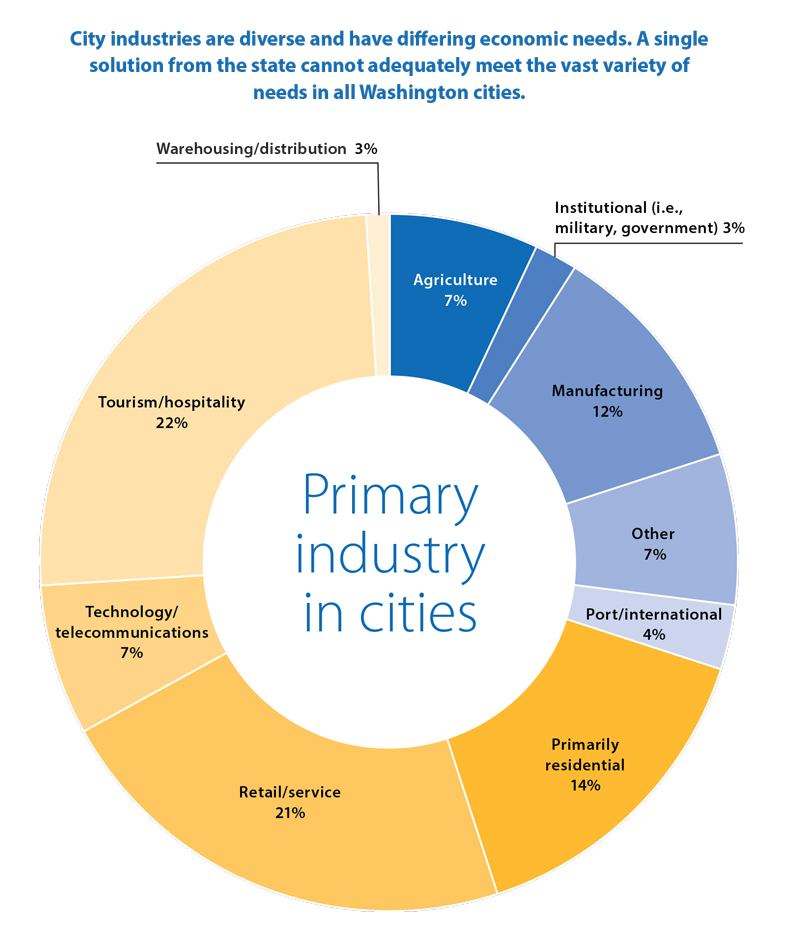Economic development
Washington cities need financing options to boost economic growth and opportunity for residents
City leaders repeatedly name economic development as one of their highest priorities. Cities drive our state’s economy and to do so they need to attract, grow, and support diverse businesses, commercial centers, and industry in our communities. City leaders also want to ensure residents have local employment opportunities and a healthy and diverse tax base. To do all of that, and achieve the shared goal of maintaining and enhancing a robust economy, cities need a diverse economic development toolkit to encourage commercial and economic growth in their communities.
94% of cities report that creating new and enhanced state programs to help spur economic development would have a significant positive community impact.
Broadband infrastructure is critical to spur economic development
Sustainable, reliable infrastructure is the foundation for building an economy. Cities overwhelmingly report the need for state investment in local broadband internet infrastructure projects to help spur local economic development.
Broadband is the “superhighway” for economic development—it’s an essential component of infrastructure that gives all residents access to opportunity. Small businesses and organizations in cities need infrastructure to process transactions, post job opportunities, buy and sell products, and participate in specialized trainings and professional development opportunities online.
Access to broadband and advanced telecommunications infrastructure is one of the most pressing needs for cities under 7,500 in population. These communities’ economies rely primarily on retail, tourism, and commuter industries. To support cities and their unique needs, funding for broadband infrastructure is critical.
54% of cities report broadband infrastructure as a significant barrier to economic development in their community.
City economic development opportunities are unique and diverse
Washington cities are diverse in their available industries and economic development needs. However, most cities need opportunities for local economic development to provide more local employment opportunities to their residents.
City economies are diverse in nature—encompassing industries of agriculture, tourism, aviation, technology, and military. Cities that report tourism and hospitality as their primary industry also have the lowest rates of local employment opportunities. Conversely, cities with technology and telecommunications as the primary industry rarely struggle to provide local employment opportunities.
These varying trends highlight the diversity in economic needs across cities and show that a single solution cannot adequately meet the needs of all cities.
Cities’ access to a more robust and diverse toolkit will encourage economic development
Cities need:
- Access to reliable broadband infrastructure to attract new businesses.
- State support to invest in infrastructure to support diverse and unique industries.
- New tools such as Tax Increment Financing to incentivize local investments.

77% of cities report that inadequate street infrastructure is a significant barrier to economic development.
New tools can help support economic development
Cities report that Tax Increment Financing (TIF) options can dramatically impact the economic health of their communities. TIF is a method of using property tax collections within designated areas to finance public infrastructure improvements. TIF, and programs like TIF, have helped many states encourage new investments from private industry and improve overall economic health. Small towns and rural cities see TIF as a critical tool that could help spur new investment in their local economy.
TIF is one example of an economic development tool cities seek to leverage. The state has also utilized “tax increment financing lite” programs such as the Local Revitalization Fund (LRF). Under the LRF program, cities use sales tax credits from the state to fund infrastructure investments that support new commercial development.
In 2017, 12 cities with LRF-funded projects reported a state benefit of $359 million.
Conclusion
Maintaining and enhancing Washington’s economy is a widely shared goal. Cities are particularly critical in this quest because they contain so much of our state’s economic activity. However, cities have limited tools available to support continued economic development. Infrastructure investment is one of the most important ways that cities can encourage commerce and industrial development, but it is also one area where city funding is stretched most thinly. Our state also lacks a key tool available in almost every other state—Tax Increment Financing. TIF (at its most basic) is a way for economic growth to pay for itself. Every city’s economic development goals are unique based on differing strengths and needs—cities need diverse tools to achieve these unique goals.